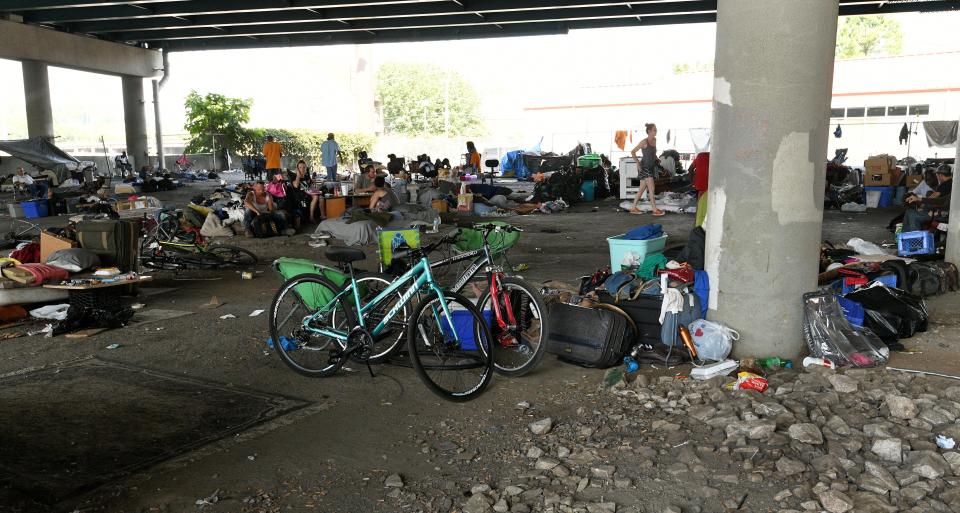Is the homeless shelter the next outpost on the rights frontier?
The U.S. Supreme Court is considering a very important case that has far-reaching consequences for America’s cities and towns. Can camps be cleared and homeless campers cited if there is no shelter available? Is there at least an implied right to shelter?
Rights are funny things. They're easily asserted and less easily justified. If they don’t come from God, they come from agreement among the governed. As Thomas Jefferson put it, "A bill of rights is what the people are entitled to against every government on earth, general or particular, and what no just government should refuse … ”
The Declaration of Independence lists life, liberty and the pursuit of happiness as God-given rights. The Bill of Rights contains rights agreed upon by the Founding Fathers as critical to limited government and the sanctity of the individual.
Is the constitutional right to be free from double jeopardy a God-given right? Few would go that far. It’s a critical part of our social contract. The founders agreed to cast it as a shared fundamental right limiting the federal government in its power over vulnerable individuals. The 14th Amendment and subsequent Supreme Court decisions extended most such rights to the states.

Freedom from vs. the right to something
Traditional constitutional rights in the United States are about “freedom from” government overreach. Any right to basic life amenities ‒ food, shelter, medicine ‒ must otherwise be included in state constitutions or created by lawmakers. The right to be free from government excess is one thing. The asserted right to a benefit the government would provide or require to be provided is another.
I’ve heard mention of almost every right imaginable over my lifetime. Some are more persuasively advocated than others. Some need qualifications. Others are asserted as a matter of personal belief.
Medical care has been on the forefront of the "right to" agenda. It’s been joined by shelter and housing. The interplay among regulations, interest rates, land, construction and labor costs has pushed the expense and availability of housing in America to near-crisis levels.
The difference between housing and shelter
Is there a right to housing? Such a right, as opposed to that for shelter, is not explicit in any state constitution, but it is implied in a few. California’s mentions a “commitment to providing housing to its residents.”
Most would grant a right to housing to those who can’t care for themselves. Many activists assert a more general right. This raises a lot of sticky questions. What kind of housing? What if someone just will not seek gainful employment? Can someone appear and just demand to be provided an apartment? What behavior is required before someone can be evicted?
In a complicated 1979 case and subsequent settlement, the city of New York recognized a “right to shelter.” This is not an apartment or housing in the traditional sense. Rather it’s a bed with a roof over one’s head. This is a significant expense, and the influx of migrants makes it just about impossible to keep up with the demand
In 2019 the 9th District ruled that the city of Boise deprived homeless people of their right to be free from cruel and unusual punishment if it forbade them to camp on public property when no shelter beds were available. That decision affected only the western states. The upcoming decision in Grants Pass v. Johnson will apply nationally. It has the potential to drastically alter the quality of life in cities across the United States.
If constitutions don’t provide rights, legislatures can still write laws to implement them. That means electoral majorities have to support them. Of course, legislatures can just as easily decide to take them away.
The American political culture is in flux. Expect a lot of discussion about what citizens or residents should be provided. All of this costs a whole lot of money. What’s a society to do? What are our fundamental values? That’s one reason we have elections.
William Lyons is Professor Emeritus of Political Science and Interim Associate Director of The Institute of American Civics at the Howard Baker School of Public Policy and Public Affairs at the University of Tennessee. He also served as Chief Policy Officer for Knoxville Mayors Bill Haslam, Daniel Brown and Madeline Rogero. The opinions expressed are those of the author and do not necessarily reflect the official policy or position of the Institute of American Civics or the University of Tennessee.
This article originally appeared on Knoxville News Sentinel: Homelessness: Is shelter the next outpost on the rights frontier?

